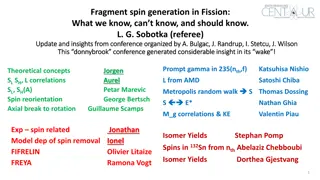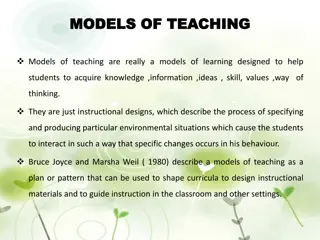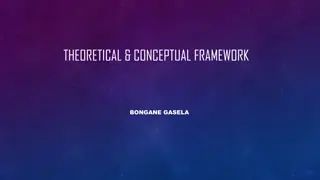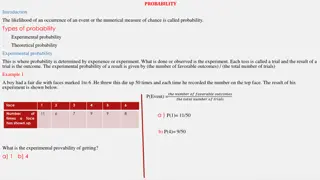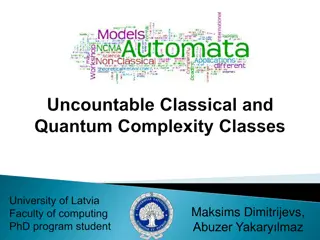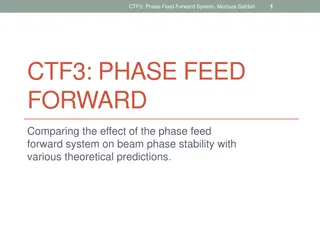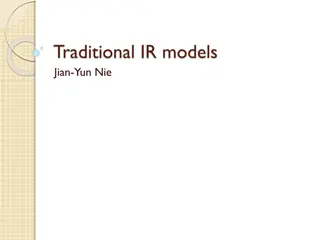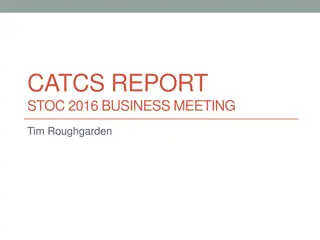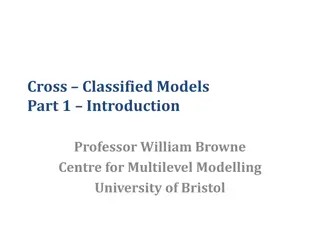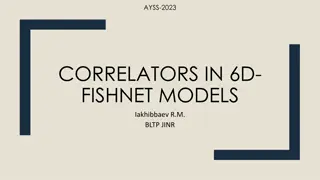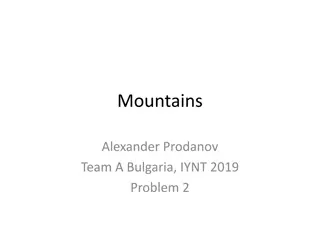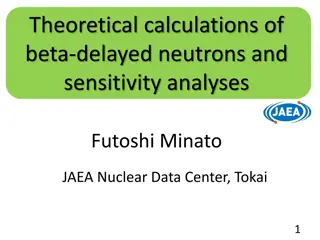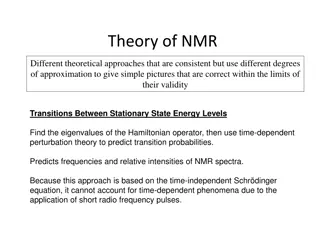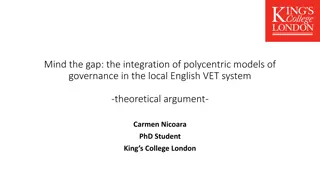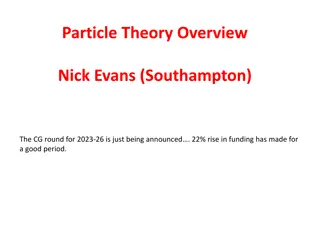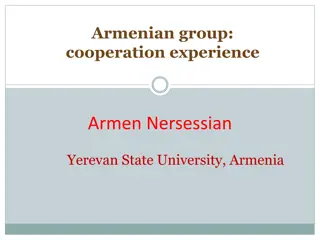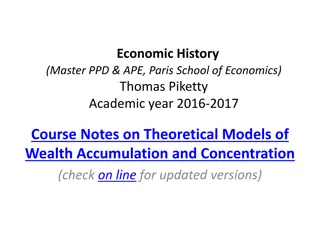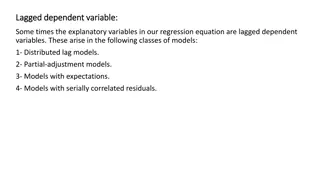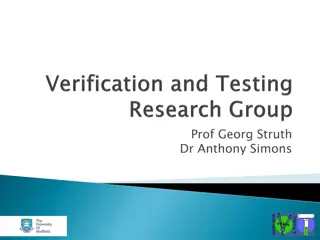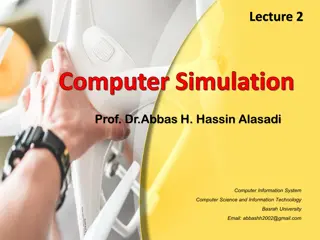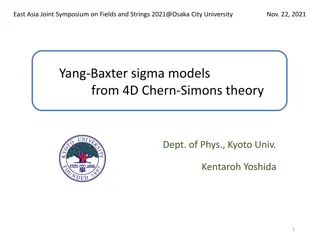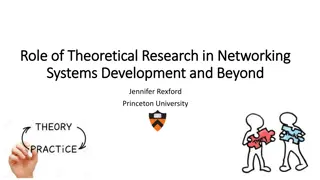Insights on Fragment Spin Generation in Fission: What We Know
Considerable insight was generated from a recent conference on fission, shedding light on crucial theoretical and experimental aspects. Key topics include angular momentum, fission-fragment spin references, and the dynamics of nuclear fission. Theoretical advancements like the TDSLDA model and super
8 views • 41 slides
System Models in Software Engineering: A Comprehensive Overview
System models play a crucial role in software engineering, aiding in understanding system functionality and communicating with customers. They include context models, behavioural models, data models, object models, and more, each offering unique perspectives on the system. Different types of system
7 views • 33 slides
Insights into Theoretical English Grammar
The theoretical English grammar delves into the subject matter of grammar, including systemic conceptions, grammatical forms, categories, paradigms, and morphological means. It discusses the constituent parts of language – phonology, lexicology, and grammar. The grammatical structure covers morpho
25 views • 26 slides
Models of Teaching for Effective Learning
Models of teaching serve as instructional designs to facilitate students in acquiring knowledge, skills, and values by creating specific learning environments. Bruce Joyce and Marsha Weil classified teaching models into four families: Information Processing Models, Personal Models, Social Interactio
5 views • 28 slides
Significance of Models in Agricultural Geography
Models play a crucial role in various disciplines, including agricultural geography, by offering a simplified and hypothetical representation of complex phenomena. When used correctly, models help in understanding reality and empirical investigations, but misuse can lead to dangerous outcomes. Longm
4 views • 8 slides
Enhancing Information Retrieval with Augmented Generation Models
Augmented generation models, such as REALM and RAG, integrate retrieval and generation tasks to improve information retrieval processes. These models leverage background knowledge and language models to enhance recall and candidate generation. REALM focuses on concatenation and retrieval operations,
5 views • 9 slides
Theoretical and Conceptual Frameworks in Research
The theoretical and conceptual frameworks in research play vital roles by grounding studies in theoretical constructs, enhancing rigor and empiricism, and guiding the research process. The theoretical framework provides a blueprint based on existing theories, guiding researchers in developing their
3 views • 12 slides
Probability: Experimental and Theoretical Concepts
Probability is the measure of the likelihood of an event happening, with experimental and theoretical probability being key concepts. Experimental probability involves determining probabilities through experience or experiments, while theoretical probability can be calculated without prior experienc
7 views • 23 slides
Theoretical Studies on Recognizing Languages
Various models such as Deterministic Turing Machines, Probabilistic Models, and Quantum Classes are explored for recognizing languages, with discussions on regular, nonregular, and uncountable languages. Theoretical concepts like bounded-error recognition, computational complexities, and enumeration
0 views • 28 slides
Phase Feed Forward System: Analyzing Beam Phase Stability and Theoretical Predictions
Exploring the impact of phase feed forward systems on beam phase stability through comparisons with theoretical predictions and simulations of increasing limitations. Testing the accuracy of theoretical gain factors and assessing performance using global gain factors. Utilizing specific data files a
4 views • 58 slides
Information Retrieval Models and Processes
Delve into the world of information retrieval models with a focus on traditional approaches, main processes like indexing and retrieval, cases of one-term and multi-term queries, and the evolution of IR models from boolean to probabilistic and vector space models. Explore the concept of IR models, r
5 views • 65 slides
Committee for the Advancement of Theoretical Computer Science (CATCS) - Overview and Initiatives
CATCS, the Committee for the Advancement of Theoretical Computer Science, plays a crucial role in connecting the TCS community with funding agencies and other research communities. Through various efforts like recruiting, serving on panels, and enhancing TCS entries on Wikipedia, CATCS aims to promo
1 views • 10 slides
Cross-Classified Models in Multilevel Modelling
Cross-classified models in multilevel modelling involve non-hierarchical data structures where entities are classified within multiple categories. These models extend traditional nested multilevel models by accounting for complex relationships among data levels. Professor William Browne from the Uni
2 views • 13 slides
Exact Correlation Models in Biscalar Fishnet Theory
In the study of biscalar fishnet models, various operators and spectra were explored, leading to findings on exact correlation functions, strong coupling regimes, Regge limits, and more in arbitrary dimensions. The investigation delves into Lagrangian formulations, graph-building operators, conforma
2 views • 15 slides
Analyzing Tallest Mountains in the Solar System
This document explores the tallest mountains in the Solar System and proposes theoretical models for predicting their maximum altitudes on various celestial bodies. It discusses the heights of mountains on Mercury, Earth, Moon, Mars, Vesta, Ceres, Io, and other celestial bodies, along with different
7 views • 29 slides
Theoretical Calculations of Beta-Delayed Neutrons and Sensitivity Analyses
In this talk by Futoshi Minato from JAEA Nuclear Data Center, topics covered include delayed neutron emission probabilities, incident neutron energy dependence, sensitivity analysis with JENDL evaluated libraries, and important precursors in r-process nucleosynthesis. Theoretical calculations are pr
1 views • 27 slides
Composite Models in Building Complex Systems
Composite models are essential in representing complex entities by combining different types of models, such as resource allocation, transport, and assembly models. Gluing these models together allows for a comprehensive representation of systems like the milk industry, where raw materials are trans
3 views • 27 slides
Insights into Theoretical Approaches in NMR Spectroscopy
Theoretical approaches in NMR spectroscopy encompass diverse methods, each with varying degrees of approximation but yielding correct results within their validity. Techniques such as transition probabilities using the time-dependent perturbation theory, Zeeman interaction for energy level transitio
0 views • 32 slides
Integration of Polycentric Models in English VET System: Theoretical Framework
The theoretical argument explores the free-riding problem in training, proposing a polycentric model of governance to address it. It discusses the role of Local Enterprise Partnerships (LEPs) in overcoming this challenge. Additionally, an apprenticeship theoretical framework and the concept of train
3 views • 10 slides
Particle Theory Overview: Funding Rise and Academic Quality Boost in UK Theoretical Physics
The recent announcement of a 22% rise in funding for UK theoretical physics marks a positive period for the field. The PPGP(T) Panel chaired by Nick Evans of Southampton has seen a growth in academic numbers, quality, and leadership since 2019. Phenomenology plays a crucial role in guiding search st
3 views • 19 slides
Probability: Learning Outcomes and Examples
This content delves into the study of probability, covering topics such as representing probabilities of simple and compound events, calculating relative frequencies, multi-step chance experiments, theoretical and experimental probabilities. It explains concepts like chance experiments, sample space
1 views • 31 slides
Challenges Faced by Theoretical Physics in Armenia
The field of theoretical physics in Armenia has faced challenges such as a decline in the number of active theorists, an imbalance in age distribution, and a loss of internal collaborations leading to integration with Western groups. This has resulted in the need for young talents to pursue opportun
1 views • 21 slides
Theoretical Models of Wealth Accumulation and Concentration
Explore theoretical models such as the pure lifecycle model, dynastic model, and random-shocks model to understand wealth accumulation, inheritance, and concentration. Dive into concepts like the Harrod-Domar-Solow formula and saving rates to analyze the dynamics of wealth growth over time.
4 views • 46 slides
Lagged Dependent Variable Models in Regression Analysis
Lagged dependent variables are utilized in various regression models such as distributed lag models, partial-adjustment models, models with expectations, and models with serially correlated residuals. By incorporating lagged dependent variables, researchers can analyze the impact of past values on t
4 views • 11 slides
Advancing Theoretical Computer Science and Industry Solutions
The Advanced Computing Research Centre (ACRC) led by Prof. Georg Struth and Dr. Anthony Simons focuses on advancing the state-of-the-art in theoretical computer science and applying theoretical results to practical industry solutions. Their work encompasses logic, algebras, formal specification, sof
2 views • 12 slides
Computer Simulation Models Classification
Computer simulation models are classified based on various characteristics such as static or dynamic, deterministic or stochastic, and discrete or continuous. Static models represent systems at a specific point in time, while dynamic models depict changes over time. Deterministic models involve no r
4 views • 8 slides
Unified Description of 2D Integrable Models: Chern-Simons Theory Approach
Integrable models play a crucial role in theoretical physics, and unveiling a unified method to describe various 2D integrable models is of paramount importance. This article discusses deriving 2D integrable sigma models from 4D Chern-Simons theory, exploring the candidate unified theory, and outlin
1 views • 28 slides
Role of Theoretical Research in Networking Systems Development and Beyond
Theoretical research plays a pivotal role in advancing networking systems development and addressing complex challenges. From designing new systems to optimizing parameters, theoretical frameworks help bridge the gap between theory and practice, enabling the development of networks worthy of societa
4 views • 11 slides
Analyzing Incidents and Learning from Issues Using Theoretical Models
In-depth exploration of incident analysis and learning process using theoretical models and quality assurance approaches. Emphasis on the reflective phase within strategic safeguarding processes to enhance leadership skills and organizational culture. Techniques like root cause analysis and the 5 Wh
0 views • 26 slides
Unified Monte Carlo: Nuclear System Analysis
In the field of nuclear system analyses, the concept of Unified Monte Carlo involves constructing a multi-variate master probability function using theory and experiment data. This function is then sampled to generate random observable parameter vectors for practical applications such as evaluations
5 views • 12 slides
Introduction to Theoretical Models of Counseling and Psychotherapy
In Chapter 1 of "Theoretical Models of Counseling and Psychotherapy," the text explores the introduction to counseling theory, discussing the advantages and similarities among different counseling theories. It also delves into the differences, explaining why no single theory is superior and how to r
5 views • 22 slides
Neural Net Language Models & Statistical Models
Neural net language models & statistical language models, n-grams, Markov models, and practical order models. Dive into neural probabilistic language models and scaling properties of models, including performance perplexity. Discover the evolution and challenges of language modeling.
3 views • 22 slides
Language Models: Probabilistic Models for NLP
Formal grammars provide binary models for language, but probabilistic language models offer a more useful approach by assigning probabilities to sentences. Explore the uses of language models in speech recognition, OCR, machine translation, generation, and spelling correction. Learn about completion
20 views • 13 slides
Ecological Modelling: Theoretical Insight into Inter-specific Competition
Dive into the world of ecological modelling, a mathematical abstraction of ecological systems, ranging from individual populations to entire biomes. Explore how ecosystem models are used to predict real system dynamics and learn about the theoretical models like Lotka-Volterra for inter-specific com
1 views • 12 slides
Computational Light-Matter Interactions and Theoretical Solutions
This material delves into computational solutions for light-matter interactions, exploring theoretical frameworks backed by National Science Foundation grants. The journey spans from experimental problems to theoretical solutions, culminating in the unifying equation, rate equation building, Hamilto
0 views • 20 slides
Understanding Metrics in Software Development
Explore the concept of metrics in software development, including classification, scales, structural models, theoretical and empirical validation, and the significance of time sheets for process improvements. Learn about different types of metrics and their impact on managing, appraising, assuring,
0 views • 40 slides
Understanding Theoretical Framework in Business Administration Studies
Explore the definition, importance, and types of theoretical frameworks in business administration studies, with insights into how they guide research projects and predictions about variable relationships. Discover the key components of a theoretical framework and its role in shaping scholarly liter
4 views • 9 slides
Understanding Models: Types, Advantages, and Development Process
Explore the world of static and working models with Dr. M.B. Kori, an Assistant Professor at B.L.D.E.A's J.S.S College of Education. Learn about the types of models, their advantages, and the process of developing models. Discover the economic, educational, psychological, social, and moral values of
0 views • 7 slides
Theoretical Analysis of Large Language Models
Explore the two levels of theory on Large Language Models (LLMs), discussing their limitations and emergent abilities. Delve into practical challenges faced by pretrained LLMs and the gap between theoretical analysis and real-world performance. Discover the insights on transformers' ability to solve
0 views • 23 slides
Theoretical Evaluation of Intelligent Backtracking Algorithms
Explore the theoretical evaluation of intelligent backtracking algorithms focusing on constraint processing, including challenges of empirical studies and the significance of a paper offering a theoretical approach to algorithm comparison. The discussion encompasses assumptions, contributions, and t
3 views • 25 slides
